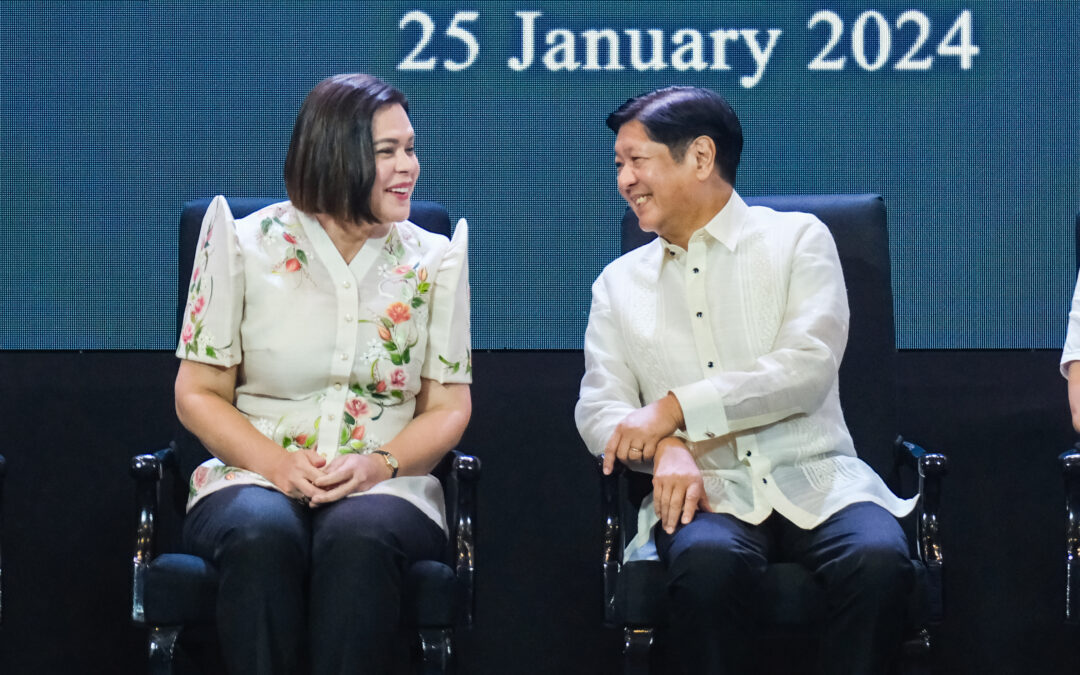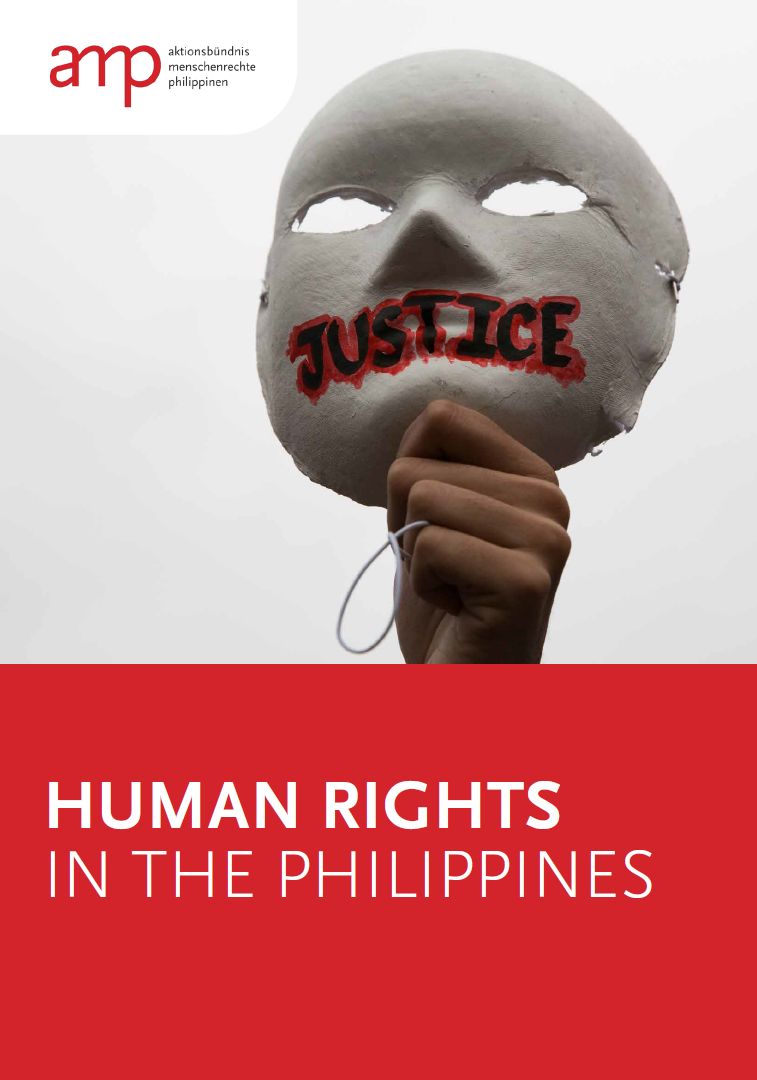Aktionsbündnis Menschenrechte Philippinen
Improving the human rights situation in the Philippines
News

Sara Duterte resigns as Secretary of Education and NTF-ELCAC Vice Chairperson
On June 19, 2024, Sara Duterte unexpectedly announced her resignation as Secretary of Education and Vice Chairperson of the National Task Force to End Local Communist Armed Conflict (NTF-ELCAC) at a press conference. "My resignation is not from a place of weakness, but is brought about by my...
Sara Duterte resigns as Secretary of Education and NTF-ELCAC Vice Chairperson
On June 19, 2024, Sara Duterte unexpectedly announced her resignation as Secretary of Education...
Senator Dela Rosa refuses to participate in human rights committee inquiry
On June 25, 2024, the Human Rights Committee of the House of Representatives held another hearing...
Fourth conviction of police officers in drug-related killing case
On June 18, 2024, the Caloocan City Regional Trial Court convicted four police officers for the...
Advocacy
As a non-governmental organization, we represent the interests of those affected by human rights violations in the Philippines vis-à-vis the human rights committees and international cooperation bodies of the German government and international parties such as the European Union and the United Nations.
Human Rights in the Philippines
By signing the Universal Declaration of Human Rights (UDHR) and ratifying various UN human rights conventions, the Philippines has committed itself to protecting, respecting, and fulfilling human rights. Implementation is enshrined in the Philippine Constitution of 1987 as well as in other agreements (such as the Bill of Rights) and institutions (such as the Philippine Commission on Human Rights/CHR). The Philippines has ratified eight of the nine most important UN human rights conventions; the UN International Convention for the Protection of All Persons from Enforced Disappearance has not yet been signed or ratified by the Philippines:
- International Covenant on Civil and Political Rights (1986)
- International Covenant on Economic, Social and Cultural Rights (1974)
- UN Convention against Torture and Other Cruel, Inhuman or Degrading Treatment or Punishment (1986)
- UN Convention on the Elimination of All Forms of Discrimination against Women (1981)
- International Convention against All Forms of Racial Discrimination (1967)
- International Convention on the Protection of the Rights of All Migrant Workers and Members of Their Families (1995)
- UN Convention on the Rights of the Child (1990)
- UN Convention on the Rights of Persons with Disabilities (2008)
- International Convention for the Protection of All Persons from Enforced Disappearance (not ratified by the Philippines)
Concrete cases
The AMP documents and monitors concrete cases of enforced disappearances, political killings, and criminalization of human rights defenders and journalists, which illustrate the patterns of structural human rights violations.
A current list of cases of political killings of human rights defenders and journalists appears in the AMP Human Rights Report of 2014, 2017, 2019, 2022, and 2024 for the respective monitoring periods.
- Enforced disappearances
- Political killings
- Criminalization
Way of working
The AMP uses civil society lobbying instruments to influence decision-makers and multipliers in Germany as well as at the EU and the UN levels. However, other means are also used to disseminate information to the public.
When talking about lobbying, many people first think of representatives of economic interests. This is why the AMP uses the term advocacy work. Since the 1990s, civil society actors have been campaigning as new forces for democracy and making their concerns heard in politics.
What we do:
- Monitoring the human rights situation in the Philippines through direct information from our partners, by travelling ourselves, and through media monitoring.
- Documenting concrete cases of serious human rights violations.
- Writing intervention/action and lobby letters.
- Regular analyses and AMP reports on the human rights situation in the Philippines.
- Briefing political decision-makers, parliamentarians, missions, and delegations to the Philippines.
- Organizing political expert discussions and networking workshops.
Publications
Report on Human Rights in the Philippines
Against the backdrop of a significant increase in human rights violations, the AMP publishes a comprehensive human rights report every two years. The reports are based on information, cases, and key concerns of our Philippine partner organizations in order to draw international attention to human rights violations in the Philippines.
Advocacy material and further reports
Advocacy work is aimed at decision-makers in politics and multipliers in Germany as well as at the EU and the UN levels. We publish statements, press releases, and other documents and reports in cooperation with the International Advocacy Networks (IAN) in order to contribute to the improvement of the human rights situation and the protection of human rights defenders in the Philippines.
About us
The Aktionsbündnis Menschenrechte -Philippinen
The Aktionsbündnis Menschenrechte – Philippinen (AMP – Action Network Human Rights – Philippines) uses lobbying and public relations work to influence political decision-makers and multipliers in Germany as well as at EU and UN level with the aim of contributing to an improvement of the human rights situation in the Philippines. Member organizations of the AMP are Amnesty International Germany, Bread for the World (BfdW), the International Peace Observers Network (IPON), MISEREOR and Missio-Munich, philippinenbüro e. V., and the United Evangelical Mission (UEM). The thematic focus of the work is on extrajudicial killings, enforced disappearances, and fabricated charges against political activists. The AMP also addresses the underlying structural problems of impunity and restricted civic space.
The AMP was founded in 2007 by church groups and non-governmental organizations (NGOs) in Germany that have maintained partnerships with civil society activists and networks in the Philippines for many years. The AMP responded to reports from these Philippine partners that the number of politically motivated killings and other serious human rights violations had increased significantly since 2001. Employees and human rights defenders from these partner networks were among the victims and those who were criminalized on trumped-up charges or forcible disappeared.

